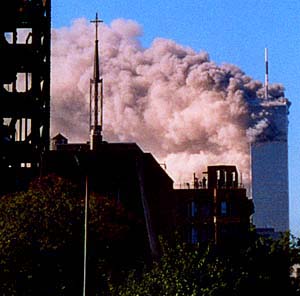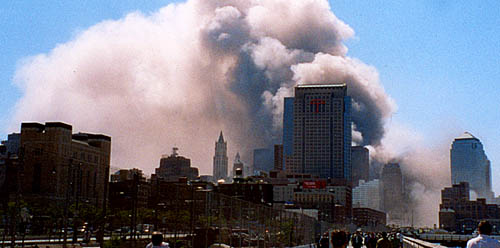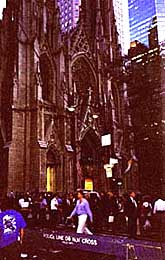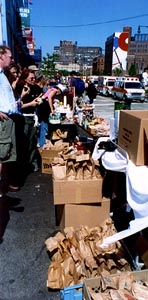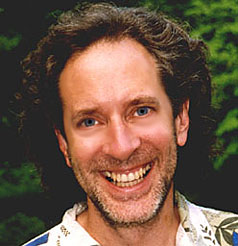New York City
September 11, 2001
| Journal Excerpts - September 11-17, 2001 notes from New York City by Tobin James Mueller for Music inspired by 9/11, see: The September 11 Project ArtsForge.com Main Page |
"I will show you fear in a handful of dust." (T. S. Eliot) The world has become a slow motion replay, stuck in time by looped newscasts, frozen in place like the cloud of smoke that hangs over this usually effervescent city, woven through each moment as an odor the nose cannot get used to. A world caught in the convulsive echo of six thousand haunting cries. The World Trade Center has fallen. I write to try and bring words back into my brain, to try and recapture my hijacked imagination: |
| September 11. Early morning. I awake exactly at the moment when the first plane crashes. Noticing initially an unusually low cloud out my bedroom window, I go to the glass in disbelief as I realize it's no cloud, but a plume of ominous dark smoke pouring from gaping holes in the side of the World Trade Center. Flames leaping more then three stories are plainly visible. I call friends to warn them, to ask if they see it too, as I continue to stare. |
| Then a huge explosion, a fireball 40 stories high, encircles the building and startles me off my feet. I would later turn on the television and discover that I had witnessed a plane crashing into the South Tower, the latter of two terrorist attacks, events I would never have believed possible. But the newscasts could not capture the immensity of the explosion, for the Towers are so large, they dwarf everything that comes near them, even hatred... Viewing broadcasts hampered by a lack of facts all the while knowing the real thing is right outside my window makes me claustrophobic. I load my camera and go outside, walking to Washington Square. A crowd has gathered, a crowd of quiet individuals watching from very separate places of awe and fear, each person wrapped in a horrible kind of isolating expectancy. Passersby mention that the Pentagon has been attacked, but I dismiss it as hysterical rumor. Perhaps my mind is dismissing even the events before me as a kind of hallucination. Then, just as I'm about to confirm with my camera the impossible scene, the crowd gasps, a few squeeze out screams, then everyone releases a collective groan more horrible than the sound of explosives. Agony, helplessness, despair choke off breath. Arms go limp and eyes sink into a new kind of sight. Some fall to the ground. Some back away, even though we are 20 blocks from the terror. The South Tower collapses, unthinkably, slinking downward like a movie reel demolition, disappearing into a cloud of dirty white. The cloud engulfs the entire downtown, standing still and tall where the Tower should be, blanketing the whole of southern Manhattan. The cloud stands so still, one believes the Tower might yet exist behind the shroud, waiting for the wind to dust it off again. It is impossible to believe what I've just witness. |
Breaking the silence, a young dreadlocked black man paces along the perimeter of the crowd like a hyena, yelling, "Judgment! Judgment! The Day of Reckoning has arrived. The white man's world is tumbling down!" The expected replies of "Fuck you" and "Shut up" are thrown back, most in comforting New York accents, and our crowd of separate silence is transformed into a collective. It seems best to leave. I cannot bare the sound of ridiculous divisiveness. As if in perfect contrast, a wiry elderly man dressed in green sweat clothes engages in muted Tai Chi on the opposite end of the park, in dappled shadow, beneath late summer trees and constant sky, creating a force field of stillness and routine, protecting himself from the incomprehensible. I think how no metaphor can grasp this event. No art, no words, no expression can render it complete. Like a rift in space, in history, there is no breadth or circumference to what has begun around us. No past experience that can help explain. Caught between judgment day and ancient repetition, we move in circles, cycles, feeling all dexterity slip away. All freedom of movement. It is only after the second Tower falls that everyone on the street realizes, for certain, that the South Tower has completely collapsed. There will be no rebuilding the upper floors, nothing salvageable. Both Towers are gone, compressed into twisted rubble strewn across blocks and blocks of buried shops and office buildings, smoldering in smoke and continued flames. The greatest monument to modern commerce and world prosperity is no more. Beneath a perfect blue sky, lower Manhattan has become a graveyard of inconceivable loss. So close yet so strangely quiet, all those lives lost. It is hard to walk. The mind races through lists of friends and colleagues who might have been affected. The reality of what must be happening just a few blocks away cannot register... |
| September 11. Late morning. Outside my apartment: A flood of refugees streams down the northbound lanes of the Westside Highway, people walking at a steady pace, not speaking, too stunned to notice anything around them. Businessmen and women from the financial district, students from evacuated schools, tourists and onlookers herded by police, everyone pushed northward by the dust and wreckage. Then a wave of survivors covered in dust and ash. And another wave. For hours to come the parade of survivors continues, surrounded by a growing symphony of sirens and roaring engines, sounds no longer jarring to these sudden veterans of shock and tragedy. |
I begin to get a glimpse of the new New Yorker. People whose eyes still reflect the beauty and pride and towering spirit of the World Trade Center, yet whose eyes are also caught in a moment, unfocused, reliving an internal torture, an unutterable gasp of disbelief, sadness, loss. Eyes that might never quite shake the desire to find something that is no longer there. This is what they form: An exodus from a past now surreal in its innocence into a future the Towers were supposed to represent. An exodus by people who, moments ago, were deep in conversation about schemes and connections, ladders to success, consumerism and celebrity. Whose lives seemed full of consumerism and celebrity. Now the shock of 3,000 spirits has rushed through them, leaving their 3,000 fingerprints of meaning. |
I used to wake each morning to the pink and gold of the sun shining off the reflective sides of the Twin Towers. I used to go to bed each night as the lights from 50,000 windows winked like vigil candles in the night sky. Not just the skyline is altered. To some the Towers symbolized the essence of capitalism, the greatest landmark in the world's greatest city, a testimony to free trade and communication. To some they were a wondrous example of architecture, the lofty product of human ingenuity that made hearts skip a beat and people raise their gaze above the horizon. Now our gazes rise to find a hole in the sky. A hole in our expectations. Something has blown a hole between us and our souls, opening up a window to something we've forgotten: our civil communal self. We are both more alone and more united. Being American is suddenly intimate, suddenly vulnerable, suddenly a catalyst to greater meaningfulness. On the street, the smell of fire fills the air with hints of odors I cannot identify. Paper blows down the street, most with burned edges, most with holes torn through their centers. The tower of smoke remains undiminished by hours of wind. Dust begins to burn the eyes. Information starved New Yorkers cluster around cars parked with their doors opened so that more can hear the radio broadcasts. I help direct people not familiar with the neighborhood to places where survivors are gathering. Hundreds of people continue to walk northward, away, cell phones plastered to their ears even though the phones have stopped working. Lines are queued up to pay phones. Everyone is amazingly calm. At one of the phones a burly man, perhaps eastern European, speaking in a foreign tongue as so many New Yorkers do, raises his voice above the crowd. His face glows, his arms wave in the air without weight, his voice cracks with joy. He has just located a loved one, establishing confirmation by pay phone that someone who was missing is found. His happiness transcends all languages. The only gladness visible, as if from a different time. People watch, myself included, tears running down our faces. Amid this avalanche of shared tragedy, his contrast reminds us again of what should be normal. This exclamation in a mother tongue other than English by someone at least as much a New Yorker as myself becomes an island of temporary hope in a wordless sea of sadness. More than the smoke and twisted metal, more than scenes of inconsolable hysteria or grave announcements from televisions and radios, this scene brings the tragedy home for me. I resolve to become more than a bystander. I head for St. Vincent's Hospital... |
| September 11. Afternoon. St. Vincent's Hospital: Ambulances line 7th Avenue. Sirens replace all other sounds of the city. Emergency traffic and the growing crowd of blood donors & volunteers force the police to block off all the streets surrounding the hospital. Soon all normal traffic will stop and the neighborhood will be turned into a "frozen zone." Lines wrap around the barricades. Hundreds, perhaps thousands, of potential donors are asked to go home, come back tomorrow. The city begins to feel like a ghost town. Perversely, I enjoy the lack of traffic, the decreased noise, the gentle way most people have adopted. While waiting to give blood, I wonder if this will become a repeated activity in a city not used to having to stand in line. Everyone around me is quietly patient, cautiously happy (or, perhaps, "inwardly honored" is a better phrase) to be able to help in some way, yet there is a gnawing sorrow just below the surface. Conversations begin, but they lack the ordinary zeal most chats with New Yorkers acquire and soon trail off without conclusion. Some people wonder if the acts of terrorism are over for the day. The bellow of fighter jets over head makes some people skittish; others ask why they arrived so late. Most people are avoiding public landmarks, like the Empire State Building or Time Square. Some people are reminded of other disasters, eventually working their way around to wondering if anyone could survive what we've all witness: The incomprehensibly lethal collapse of two 110 story skyscrapers. Some people are passionate about rebuilding the Towers; others think it's not worth the risk, that they, themselves, could never again work so high up in the sky. I'm the only one that suggests the age of 100-story skyscrapers is already past, out of economic necessity, even though I wish it weren't so. Everyone hopes a new age is just around the corner. A new age of anything. The consensus is that it will take 10 years for the downtown area to recover. White news trucks, each with their own satellite dish, start to line the opposite side of 7th Avenue. Anchorwomen begin applying lipstick. Brighter than white lights are arranged. Thick cables and cords crisscross the sidewalks. They disrupt the easy manner of the proceedings. Four truckloads of police show up to manage the crowds, the media. The area begins to look like a movie set. The first people looking for missing friends and family arrive, taping xeroxed pictures to the brick wall outside the hospital. They pass out copies, pleading with everyone to call the number listed if their loved one is spotted. Other photos are added, more copies passed out. Physicians in green garb peruse the gallery, drinking coffee, reading every word. I hold a dozen in my hand, not wanting to throw them away. We continue to stand, then are divided into blood types. We hope, without speaking about it, that there will be enough survivors to use all this community blood. Considering the devastation we know has occurred, the number of ambulances seems too small. As I walk home I see a new bit of graffiti scrawled across the local deli's painted wall. "I am alive," it reads. I wish it felt true. |
| September 11. Night time. Union Square: Making my way to Union Square, I begin to recognize faces from the gallery of missing persons. Copies have been posted along police barricades, in shop windows, on phone booths and bus stops. Faces I've come to know but will never meet. Everyday people in every day poses, holding daughters & sons in their arms, blowing out birthday candles, posing in cap and gown, standing tanned and relaxed on vacation. People captured at moments of joy, full of life. I wonder if they would be recognizable even if they are rescued. "Worked on the 104th floor," says one. "A very helpful man and loving father," says another. "Four months pregnant," one adds at the very end. Strangers stand on corners reading everything, tears streaming down their faces. Others stare southward, finding only smoke and a darkening sky. I continue on to Union Square, not wanting to read any more, fearing that I'll be unable to assimilate them, not wanting to take in more than I can remember. The first of a long string of nightly vigils begins. (I attend several, and each becomes more crowded as word gets out.) Union Square is full, an undulating mass of searchers and speakers from all walks of life, young and old, all races. Candles cluster everywhere, beginning as personal vigils around propped up pictures of the missing. Most have been transformed into public displays of empathy by a hundred additional candles, flowers, written remembrances and prayers, rippling out from the original cluster like waves of light, overtaking the park. Sheets of paper and cloth are taped to the ground and markers are scattered to encourage anyone to write thoughts, draw images, post reactions, or simply sign their names. What strikes me most is the sincerity of those people who are writing, and the earnestness of those people who are reading. Side by side reside opposing thoughts, contrary views silently written one after the other. People praying for peace; people calling for retribution. People urging love as an answer; others urging justice. And no one is arguing. Someone holds aloft a photo of an Arab child standing amid rubble, "Victims of terrorism, all," reads the caption. Another calls out that America must be strong, that to deter more killing we must fight fire with fire. Everyone says what they need to say without interruption or condemnation. I wonder if I'm in the right city. Nearly everyone snakes their way through the entire labyrinth of candles and written offerings. It is as if the whole town is as thirsty for words as I. As if everyone is hungry for wisdom. Something that might lead us toward greater meaning. Something that might make our lives feel substantial again. |
For this is what grips us most, after the shock and fear are absorbed: Apathy. Not a lack of caring toward the victims or toward grieving families or toward the relief & rescue efforts... Apathy toward ourselves. Our lives. We seem suddenly small. And what we do, day in and day out, our opinions and our ambitions, seem so insignificant, so beside the point. It is not merely that we confront the horror and sadness of the many deaths this day has wrought. We confront our own lives and weigh its importance, its worthiness. And as survivors of so great a tragedy, we cannot place ourselves in the balance. We fear there is nothing we can do, plan, believe or accomplish that might ever make sense of things, or bring sufficient consequence to any of our actions. The people who talk peace, who say an eye for an eye makes two men blind, do not want their lives diminished all the more by further destruction. Those who seek justice want to protect their future and do not want their lives diminished by further loss. Both sides seek wisdom. The congruence of personal meaning and public integrity. But are we brave enough to be wise? Change has thrown itself like a mirror in front of our complacent path. It is time to think about where we are going. The Twin Towers, visible from nearly every spot in Manhattan, have always been a kind of compass. A beacon. When I first moved to the City, the Towers continually helped me orient myself. Now this lodestone is lost. Turning about, searching the skyline in vain, people feel directionless, uncertain where they are, which way to move. A great compass has disappeared. We light candles as remembrances, candles to illuminate our path. But are we ready to move forward, into a world without safety? To me, the Towers were not just a compass providing direction. They reminded me of the power of energetic creation. They were monuments to the mystery of the possible, a testament to what can be done. A crossroads of dreams and skill. Impossibly high, now, as I try to envision them against the night sky. How could a tower exist that is more than twice the height of the buildings surrounding me, buildings that already touch the stars? Yet, each day, popping up sweaty and tired from the subway, there they were, two beautifully clean super towers, brothers in arms telling me that this is what is possible... not just once, but twice. A monument in parallel. Not a static statue, but a teeming and vibrant place where daily work gets done. A reminder that an impossibly huge amount of people can live within an impossibly small space and coexist. Because they are all doing something someone needed doing, freely, one next to another, adding up to more than one could ever conceive. The opposite of sloth and resignation, the World Trade Center stood as a symbol of the energy of accomplishment. Striking at the heart of what is America, the terrorists couldn't have destroy anything more poignant. Now that the Towers are gone, along with 3,000 irreplaceable lives, it is difficult to summon the kind of energy and courage they inspired. Or is it? As I prepare to leave Union Square, my mind again humming with words, a fire engine swings by. A huge applause rings out. The firemen aboard seize the moment and let their sirens whir, sending the crowd into a frenzy of cheers. Suddenly there is one voice, one hurrah. The people of this city, so recently consumed by the shallow and illusory celebrity of actors and the flash of transitory wealth, respond to a new hero in their midst. A new bravery. A new standard. Perhaps it is only against our will that wisdom comes. Only after suffering or struggle. And perhaps it is the embrace of wisdom that is able to give meaning to this tragedy. Wisdom that yields kindness, courage, energy and a creative spirit. Hard won, but providing the way of change. |
| September 16. Saint Patrick's Cathedral. Early evening. (The next several days were spent building a volunteer army at Chelsea Piers that supplied Ground Zero and serviced fireman & paramedics along the Westside Highway, an effort that was wonderful and inspiring. I'll describe that later. Instead, I'm skipping ahead to discuss the special Mass offered to these same rescue workers. I want it juxtaposed to the similar events in Union Square already described, as it is in my mind.) A dense line, four people wide, encircles the block around St. Pat's Cathedral. I join in and slowly follow my way to the entrance, finding myself among the last group of 100 to be invited in. All the pews look filled, but ushers move people around, making additional room, so I become one of the lucky last that doesn't have to stand. The congregation (if you can call the once in a lifetime attendees of such a public event a congregation) is very quiet, in contrast to the spontaneous singers, proselytizers and philosophical advocates that populate Union Square. In this vast yet overflowing cathedral, you could hear a penny drop, or a child's whisper, but there are no such noises. The audience includes scattered pockets of police officers and fireman, grim-faced and solemn, unlike the tired yet upbeat (almost jovial) energy of the guys at Ground Zero or the humble gratitude that surrounded the same crew while on break at Chelsea Piers. Now they have taken on unconcealed sadness, without armor or adrenaline or hope of survival to filter their grief. Washed and well-groomed, in dress uniform, they look emptied out, distracted, dull beneath their medals and brightly colored patches. These are people who came for a different kind of solace than most of us, with a different category of remembrances. As music wraps itself around the larger silence, ushers hand out roses to every person there. Every single person. A cut rose of white tipped with red, like a wound in bloom. They are fresh and soft, without thorns, ends capped in a vial of water. Seeing a fireman in front of me take his rose in huge wide hands, lifting it to his nose, tearing, made several around me cry. This simple gesture, shared by mourners and lovers from time immemorial, it is a moment that sweeps a life clean, leaving it helpless and without measurable purpose. Searching for a saving fragrance, a grace, we seek a new breath of Springtide and rebirth and growth that might be able to absorb all the lives that came before. We imagine the very air filling with comfort, a hint of certainty that life, indeed, continues, flourishes, will spread like weeds and bloom like rosebuds, even when we feel chained by our own sadness and betrayed by our own silly insignificance. The very concept of significance no longer matters. Only the precious things we hold in our hands. And breathe in. Loves. Lives. I look around at the people near me, watching them share the sign of peace. I watch them simply sing, recite, pray, and gather their possessions to leave, rose in hand. And I realize only the fireman and small groups of police have come in groups, that everyone else has come alone. All of us who spoke so easily with one another while standing in line now peel off and go back to our lives, alone. A city of people alone. This is a city of cut flowers, made up of people who have left roots behind in hopes of blossoming alongside something wonderful, risking. People who've left family and friends, stability and certainty, in pursuit of something they think the City will help nourish, because of it's unique context and interconnections. People alone... who now carry with them the buoying weight of 3,000 souls and the handshake of a million mourners... all crowding into each other's heart where, now, there is standing room only. |
We pour out onto the street, through huge brass doors, below the feet of Atlas (the magnificent statue that anchors Rockefeller Plaza), a true congregation. Bleachers have been set up across the street where a crowd, overflowing, waits as if there is still more to come. They've been listening to the mass over loud speakers placed on street corners. Then the fireman step from the church and I understand why they haven't begun filing home yet. The entire neighborhood, what seems like the entire city, the entire Nation, cries out, applause obliterating all other sounds, applause that lasts minutes, stopping traffic, stopping passersby in their tracks, stopping, for a moment, the world. And the New Hero is celebrated, the new American luminary. A hero whose significance is not trumpeted like a boast or even articulated from within; rather, a hero whose significance is proven only in terms of common interaction. It is not merely bravery that makes us applaud, that makes these men and women great in the wondrous new every day sense. It is the ability to see others as infinitely important, to envision community in each solitary citizen, to experience dignity in the happy lives of neighbors and countrymen, to be ready, each and every moment, to give. To live life as if "significance" only matters in a context much larger than oneself. To understand that acts of creation endure as the greatest contrast to evil. And, suddenly, we are all proud of being human. With that numb yet waking sense, we move forward. We keep moving forward. |
|
September 15. Chelsea Piers, pier 59. Volunteering. I began as one guy behind a table of coffee and donuts, stationed on a sidewalk alongside a temporary ambulance dispatch mobile home unit. After three days time, I find myself the coordinator of an army of 200 volunteers who have transformed the entire Pier 59 warehouse into a makeshift mini-mall for rescue workers on break. In addition, we staff a thriving deli-sized food station that feeds hundreds of fireman and ambulance personnel along the Westside Highway. We stock an amateur distribution center that fills a Police Harbor boat every 20 minutes (with respiratory masks, goggles, medicines, clothes, shovels, food and anything else we can find) destined for the Hudson River side of the World Trade Center. It is a miracle of kindness and caring. An explosion of energy from people who don't know what else to do. Each of us, for a few moments, forgets the sadness. Inside our revitalizing utopian voluntary brotherhood, we are able to breathe again, and smile, in a familiar, purposeful way. Everyone here was rejected by the city's official sites. I accept anyone who wants to help and anything anyone wants to donate. We find a place for everything and everyone. A hopeful would-be volunteer comes up to me and ask if there is anything she can do. I give her a task, and that's the last direction I need to give. Each volunteer becomes a self-motivated never-say-die powerhouse who does whatever it takes to get the job done. Then they find a hundred more jobs to do. There is so much to do. |
||
|
||
Because we started on the sidewalk outside Chelsea Piers, we were highly visible. Donations piled up behind our tables along the waterfront. The police roped off the growing area with yellow NYPD tape, providing a controllable perimeter. This gave us the air of legitimacy. A Harbor Police boat showed up requesting stuff we just happened to have stockpiled, so we filled it. They came back for more. Soon regular shipments were running out of the dock behind us down to the dock at Ground Zero. As time went on, we got better at finding whatever the guys down there needed. They gave us a walkie-talkie. I walked over to St. Vincent's and talked to the media, giving them a list of requested supplies. People began showing up with carloads of everything from pizzas to welding gloves. Nothing was planned; nothing is official. Acquiring this wonderful warehouse, the size of 3 basketball courts, was also a complete accident. On Thursday night it rained, the temperature plunged. At about 2:00 AM a security guy at Chelsea Piers let us take our things inside. By noon the next day we'd taken over the entire place. We never had authorization, only need and an overwhelming momentum of giving. It's so much fun to participate in, I forget to sleep. Many of my volunteers have been working for over 36 hours. It is difficult to bring oneself to go back home. The thought of closing my eyes makes me tremble. On the next day several people show up looking for a place to live. They couldn't get back into their apartment because it is adjacent to the ruins. I turn to a new volunteer who has been trailing me to find out what needs to be done next. I ask if he has a cell phone and introduce hiim to the new homeless. Two hours later I come back and they have a table set up ringed by volunteers I don't even recognize. They are calling hotels in town with space to spare (which is nearly every hotel in the phone book), finding rooms for people who need them. I notice a list of over 30 names still unchecked. But Chelsea Piers wants their space back and we have only hours left. Because of our amazing success, the mayor's office intervened on our behalf but was unable to negotiate an agreement. Tomorrow morning FEMA (the Federal Emergency Management Agency) will take over our operations and all the volunteers will disperse. An amazing span of days will come to an end, and the feelings of helplessness will slowly return. Unless our daily lives fill in. But something tells me nothing will ever be quite like this. |
||
Two nights ago, I road the boat to Ground Zero to assess how well our relief effort was working. It was an unforgettable experience witnessing the devastation firsthand. I realized why all the guys wanted goggles: The dust hurt my eyes so much it was difficult to keep them open. Three inches of grey muck made the ground very slippery. There was no where to sit. When one of our boats would arrive, someone would yell from the bow, "Form a line!" and a hundred fireman would form a serpentine path to the water's edge. No complaints, only good-natured bantering. They'd walk over, continuing their conversation, and hand boxes to one another seemingly without effort. The shops and restaurants along the backside of the WTC complex were converted into a bazaar much like our Chelsea Piers mini-mall. Everything was getting done without anyone in particular being in charge. Then someone yelled "Run!" and the entire crowd joined in a controlled dash over the slippery muck, away from the towering ruins surrounding us. At the water's edge, where we couldn't run any farther, people were ordered to pick a "buddy" in case one of the teetering buildings actually fell. I shook hands with a stranger as we both squinted through the smoke and gloom to guess which building was ready to go next. My partner, unbelievably, was from Fond du lac, Wisconsin. Before long we were discussing Packer football at the skeletal feet of the WTC atrium. Everything was painted in shades of grey, our red-cheeked faces providing the only color. I began to realize how tired I was. If I had to jump in the water to save myself, I wouldn't last long, I thought. So, instead of waiting for the "all clear" signal, I decided to start homeward and rest up for tomorrow. I picked my way around the rubble, along the edge of sun-bright spotlights, tipping my yellow hard hat to clumps of teenage National Guardsmen and bleary-eyed police. It started to rain. As I surveyed the decimation, I realized, in a detached sort of way, how much worse it looked compared to what the television cameras could capture. Blocks and blocks, heavy and stark and final. Hundreds of dwarfed rescuers crawling like ants over the crumbled, compressed mass. Inexhaustible smoke curling through the ignored rain. If only they could find just one survivor alive, I thought to myself. Just one. |
||
Nothing could look as lifeless as this busy, bright, taxing sight before me. A florescent pocket of activity in a blackened, burned out cavern of destruction. If this could be the end of it, the end of violence, it might be easier to handle. But I fear for the future, thinking this scene is just the beginning. I want to think of nothing but the effort ahead. Rebuilding. The determined effort to turn these haunted blocks of carnage into a place where spirits can soar. Again. God knows there are enough spirits here, waiting. Turning away, I walked north through blocks of emergency tents, over reams of torn and charred paper. I passed a number of scattered ash-cover shoes, the last vestige of panic. A swarm of mice scurried underfoot, finding new cracks in the sidewalk. The rain fell harder, soaking me. I hoped it would wash away some of the dust. But not the pain. The pain of this place I wanted to keep in side. I'm not ready to give it up just yet. |
| September 17. Afterward. It is impossible to sum up, to draw conclusions. Maybe later, but not yet. The grief of strangers has become our own. Now we work, together, to make the world safe for joy. Or make ourselves brave enough for joy in a world less safe. We work to make ourselves more vigilant, in so many ways. We struggle to give our daily lives the kind of meaning this past week extends toward us as a legacy. A challenge. The kind of meaning we, the survivors, want to believe we are capable of effecting. For the meaning of their deaths can only be shown in how we live our lives. I look forward to watching New York rejuvenate, become something new, something more. I look forward to finding a sense of youth in the process, an American sense of youth, no matter how old and weary I catch myself feeling in moments of sad reverie. And I vow to never forget the dignity of this experience. 9/17/01 |
|
© 2001 Tobin James Mueller
|
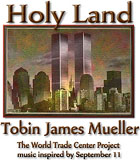 |
Tobin's Bio
WTC Journal - 9/11/01
What Survives - Jazz CD
Tobin's Poetry Showcase
Tobin's Music Showcase
Tobin's Art Showcase
ArtsForge Main Page
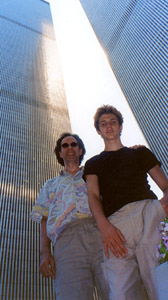 |
